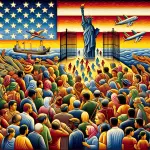Addressing Human Trafficking at the Border
For many of us, the realities of human trafficking exist only within the realms of horrendous stories, documentary snippets, or dramatic Hollywood movies. Unfortunately, these narrative fragments represent a pervasive, global phenomenon, one that particularly plagues our borders.
The Scope of the Crisis
Human trafficking is not just an isolated incident – it’s a full-blown, humanitarian crisis. According to estimates by the International Labour Organization (ILO), there are approximately 40.3 million victims of human trafficking globally. Of these victims, a significant proportion are smuggled across borders, with the US-Mexico border being one of the prime trafficking routes.
Why Border Security is Imperative
The lax border security has consequently morphed into a breeding ground for illicit activities. We cannot overlook the undeniable correlation between ease of border crossing and the increase in trafficking incidents. A more fortified border security infrastructure will unequivocally prove detrimental to the trafficking networks’ operations.
- Enhanced Surveillance: Technology-enhanced border monitoring can help in detecting and aiding potential victims faster. It is this balance of man and machine that can help curtail illegal cross-border activities.
- Increased Border Patrol Staffing: The border patrol needs to be well-resourced in terms of both personnel and equipment. A larger workforce stationed at critical entry points can significantly reduce cross-border illegal activities.
The Role of Immigration Reform
Comprehensive immigration reform is central to curbing human trafficking. Strict restrictions on legal immigration pathways contribute towards an increased demand for illicit smuggling services, thereby inadvertently fostering the human trafficking trade.
- Overhaul of Immigration Policies: An alignment of the current immigration policies with the realities of economic demand is necessary. A transparent, legal process for potential immigrants to enter and work in the country can dilute the trafficking market.
- Better Labor Market Oversight: Industries and sectors known for employing undocumented labor should be brought under the scanner. Strengthening worker protections would dissuade businesses from supporting the illicit labor market.
A Collective Responsibility
At the end of the day, curbing human trafficking is a collective responsibility – of the government, the policy makers, the law enforcement agencies and, most importantly, we, the people. It requires substantive changes from all quarters; a symbiotic push towards an eventual trafficking-free world.
Remember, every time you advocate for stricter border controls or favor a well-defined immigration reform, you become a part of the solution to this horrifying human rights crisis. Let the fear of the consequences be your drive; let the belief in a better future be your motivation.





